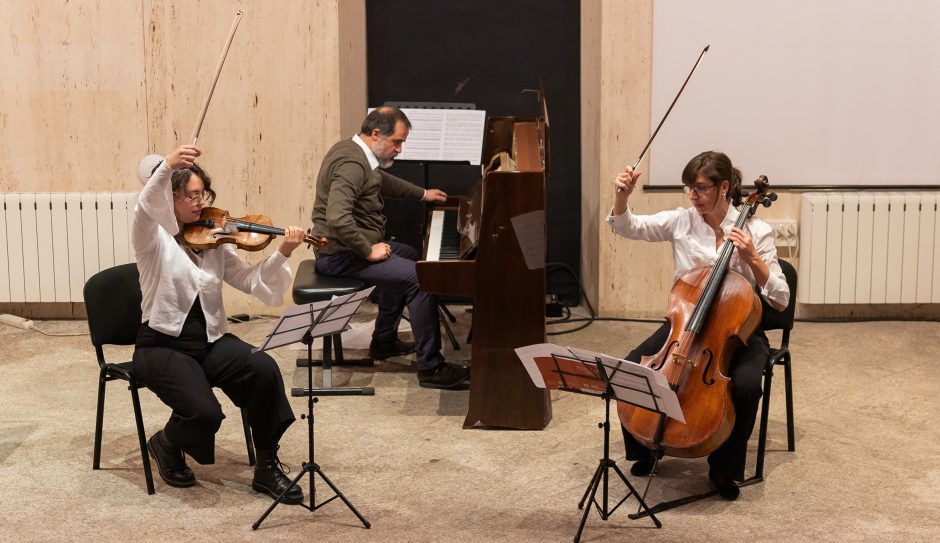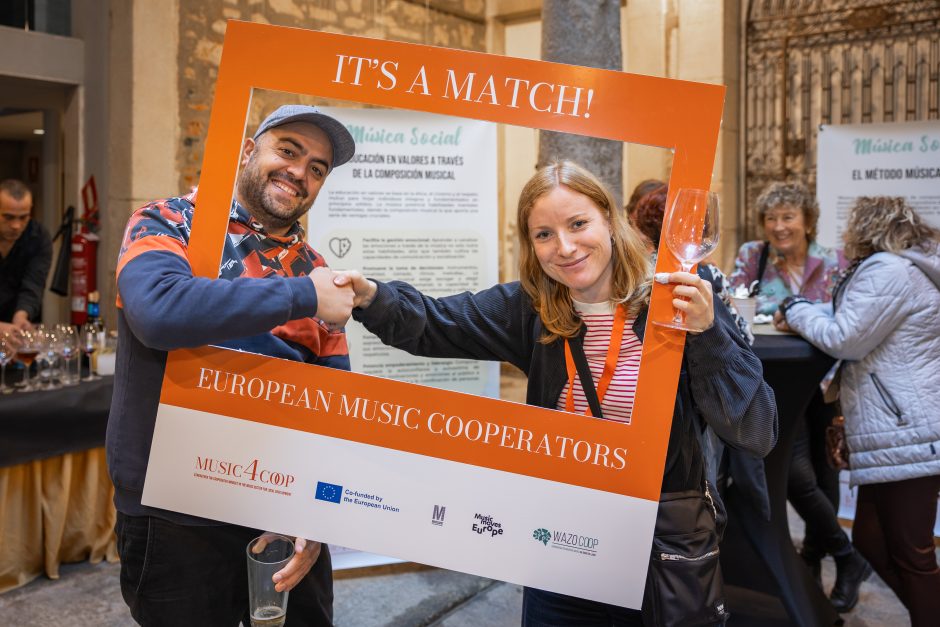Music often plays a vital role in social transformation and community building, connecting people with their emotions and each another. At the same time, workers in the music industry operate in a challenging environment of precarious work, a situation which has only been exacerbated by Covid-19.
In response to this, a Europe-wide initiative called Music4Coop has been launched to advance the rights of workers in the music industry and help them drive sustainable development in their communities.
Led by Spain’s Wazo Coop, Music4Coop is working to develop a new professional role of “music cooperator”. This involves working with community stakeholders to promote sustainable development in rural, low-populated and remote areas of Europe.
Marta Lozano Molano, Wazo’s president, said: “We thought that it was very interesting to find a model for all those music professionals who are willing to work far from the big centres. Cultural institutions normally are in big cities. In small cities, you find some of them, but sometimes in rural areas and low populated small villages, it’s difficult.”
This is a model already being used by Wazo Coop in Spain’s autonomous community of Extremadura, says Molano, herself a classical composer who works with Wazo Coop to run creative projects which benefit the community.

As well as contributing to the sustainable development of communities, the model Music4Coop proposes brings greater protection for workers and opportunities for decent work, says Molano, as it encourages music cooperators to organise within their own worker co-ops. This gives workers direct control over their work, unlike traditional music institutions which are often run hierarchically, and opens up more opportunities for musicians to find meaningful work in their communities.
“In classical music especially, there is no market – you have to be a teacher [to work in the industry],” she says. “If you want to work in education, that’s fine. But the point is that musicians nowadays [generally] have to be working in education, in music institutions like conservatoires or orchestras or wherever. And in their free time, they find a way to implement their own projects.”
Related: Lewisham arts co-op looks to create a grassroots music venue
The alternative to this, says Molano, is for musicians to work in a job unrelated to music in order to pay bills, and invest their own salary into their creative practice in their spare time.
“The point is that if you want to get by just through doing music, you can’t. [Which is why] we need this social protection. This is not happening in rural areas because co-operation does not exist in the way that we are imagining.
“So if you are good for your place, and you co-operate for local development, the village will improve as well as your working conditions. So all will be happy.”
Music as an artform often lends itself to the principles of co-operation, says Molano.

“You have to work all together for the common good, which is the music, [such as] a symphony or sonata. What we want is to imagine a composer that is not only writing music for whatever orchestra, but also to involve children of the village or to recover abandoned heritage spaces, these kinds of things. It’s more like music as a tool.”
Music4Coop recently recruited a cohort of 20 aspiring music co-operators onto its programme. The class of 2023 spans 13 countries and a range of professional backgrounds including project management, music production, performance and education. They gathered in November for a three-day festival and co-operative experience in the Unesco World Heritage city of Cáceres, Extremadura, to begin their journeys as music co-operators.
The first day of Music4Coop Fest focused on capacity-building workshops and offered an opportunity for each aspiring music co-operator to share their stories of co-operation.
Day two involved a guided tour through the history and culture of Cáceres, followed by a co-operative hackathon, where they were tasked with creating a cultural ‘second life’ for selected buildings in the city.
The final day saw the 2023 class of music co-operators coming together with 30 community stakeholders to explore ways of working together around sustainable rural heritage, as well as a ‘Social Music Concert’, featuring compositions from Molano.
Molano described the feedback from participants as “very good, I have to say – they were really happy [to be there] because not all of them were coming from very rural, low-populated areas. Maybe they were born there, but they had to live in the capital cities because there are more opportunities.”
Participants also seemed enthusiastic about the co-operative element, Molano added.
“Sometimes, people who are not very close to co-operatives and the social economy don’t understand really what co-operatives or worker co-operatives are about. [But] they were ready to create their own co-operatives in their country. So we’ll see what happens.”
Music4Coop Fest also saw the launch of the European Music Cooperators Manifesto, which includes seven key points:
- We will jointly lead the social transformation of our environment
- The transformative power of music will be our driving force for sustainable change
- Co-operation will be our key strategy to achieve a fairer future
- We will always be an indivisible part of the local community in rural, low-populated and remote areas
- We will practise the oxygen mask principle, by prioritising self-sustainability based on decent work
- We will co-found democratic and jointly owned organisations
- We will maintain a European perspective in our local action.
The next step for Music4Coops is to publish and promote the profiles of its 20 aspiring music co-operators online and through its music and social economy networks.
A digital toolkit is also soon to be released on the Music4Coop website, which will educate people in the key areas required to become a music co-operator: the European music cooperators’ mindset; sustainable local development; economic sustainability; and organisational sustainability.
In a recent statement on its website, the Music4Coop team reflected on the event.
“Music4Coop Fest has been more than an event,” it said. “It has been a confirmation that music is a language that can transform communities, connect cultures and revitalise our most cherished heritage. As we say goodbye to this edition, we take with us the inspiration and determination to keep music as a pillar of our work at Wazo Coop.
“Thank you to everyone who joined, co-operated and shared their passion and vision. The chords of Music4Coop Fest will continue to sound, reminding us that together, we are the melody of change.”